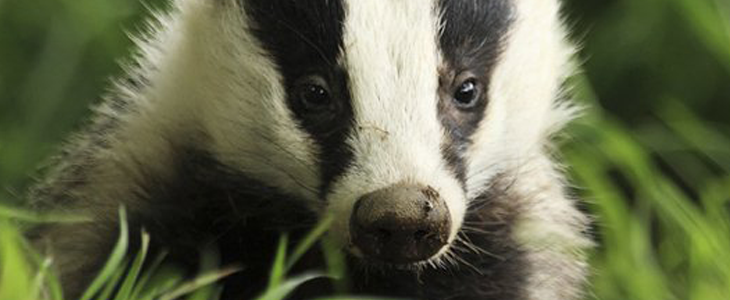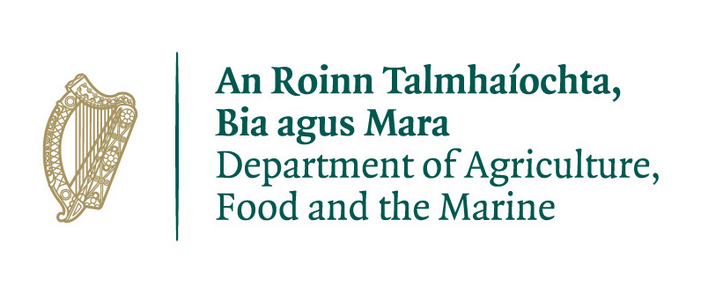
Badger
Badger - Meles meles
Badgers as a species do little harm to cereal crops and other animals in Ireland, they are effective pest controllers as they reduce rodent numbers and destroy wasp nests. They have no natural predator in Ireland with man still causing the highest number of badger kills.
Illegal badger persecution still occurs in some areas where sett exists are blocked; smoke or dogs are released into the entrance forcing the badger to come to the surface where they are killed.
Accidental road kills account for a large number of badger deaths each year with the same locations seeing regular collisions with traffic as the badger will use the same pathway to cross roads in its territories, the numbers of badger road kills increase in the spring as this is the time that young badgers leave the sett to establish new territories.
Badger Crimes
Badgers are protected by law in the Republic of Ireland under the Wildlife Acts 1976 to 2012.
They are also protected under the Bern Convention (Appendix III)
Unless authorised to do so under a valid licence/permission/derogation granted by the Minister for Arts, Heritage and the Gaeltacht under the Wildlife Acts 1976 to 2012 it is unlawful to:-
- Hunt or kill (or attempt to do so) a badger otherwise than under and in accordance with a permission or licence granted by the Minister for Arts, Heritage and the Gaeltacht
- Wilfully interfere with or destroy a badger sett (its breeding and resting place)
- Possess a badger, whether alive or dead, or any part, product or derivative thereof other than one lawfully taken pursuant to the Wildlife Acts
- Sell, keep or offer for sale, or engage in taxidermy in respect of a badger or any parts, products or derivatives thereof other that by a licensed wildlife dealer with a lawfully acquired specimen
BADGER BAITING
Badger Baiting which involves the digging of badgers from their setts to be fought and killed by dogs is still happening today in every county in Ireland. Sometimes badgers are taken away from their setts to be abused at more discreet locations.
It is a callous and brutal activity practised by a loose network of unscrupulous people who, for obvious reasons, are very secretive about what they do.
SNARES
Badgers are often trapped illegally with wire snares. Even when they are the unintended target the consequences for them can be fatal. The snare lodges around the neck and they may even get a front leg through as well but all too often they are snared around the abdomen just in front of the pelvis.
A badger is a strong animal and will put up a huge struggle when snared, often lasting for days until it dies from injury and exhaustion.
PERSECUTION AT BADGER SETT
A badger’s sett is its underground home which is shared with other members of a social group. It is the place where they breed, rest and spend most of their lifetime. Any wilful interference or damage to a sett is an offence under the Wildlife Acts.
Unfortunately most badger persecution happens at or near their setts usually in the form of digging out and can be recognised by the signs of excavations and spade marks.
In most cases badger diggers will attempt to cover their tracks. Pits dug into the sett to get at the badgers will be carefully infilled and covered with leaf litter to make everything look normal. If the loose soil is removed from these pits it will often reveal much damage to the sett and sometimes the corpse of a badger.
Occasionally people who believe badgers can cause damage or are a threat to livestock will attempt to get rid of them by destroying their sett with large earth moving equipment or by pumping farmyard slurry into it.
BOVINE TUBERCULOSIS
Badgers and many other animals are susceptible to TB infection. They are considered by many to be the main vector in the spread of the disease to cattle. However, this is hotly disputed by others and the controversy is likely to continue for some time.
The Department of Agriculture, Food and the Marine under licence from the Minister for Arts, Heritage and the Gaeltacht removes approximate 6,000 badgers annually as part of its bovine TB strategy. The licence allows the use of a specially approved snare to capture the badger. The snare is designed to hold, prevent strangulation and minimise stress to the animal until the operator arrives and dispatches it humanely.
Wildlife Licensing Unit,
Department of Housing, Local Government and Heritage
National Parks and Wildlife Service
90 King Street North
Dublin 7
D07 N7CV
Email: wildlifelicence@npws.gov.ie
Call 01 888 2000
Recording evidence at the Crime Scene
Assessing whether a criminal offence has taken place may not always be straight forward and other possibilities such as natural deaths, predation and legal hunting should be considered.
If you come across a wildlife crime scene or a dead bird or object that may be related to a wildlife crime, every piece of information is – or might be – important, but it needs to be recorded properly and accurately for the authorities to have a chance of prosecuting an offender.
Before you do anything else it is very important that:
- You do NOT put yourself in danger by approaching anyone you suspect of committing a crime – they may be violent and/or aggressive.
- You do NOT touch any dead birds or animals. They may be poisoned baits or victims of poisoning. Many poisons (e.g. Carbofuran) are extremely dangerous to us as well as wildlife in even very small amounts and can be absorbed through the skin.
- You do NOT disturb the scene by walking around unnecessarily – small pieces of evidence (cigarette ends, footprints, the marks left by a spade etc) may be lost or trampled into the mud or grass.
- You do NOT move any items at the scene – unless asked to do so or an animal or human”s welfare is/may be compromised by leaving it at the scene.
- You do NOT mark the site (e.g. with a white plastic bag) Although being able to see a marker from a distance might sound like a good idea, it will also alert an offender that someone has been at the site and they might go back and remove evidence.
- You do NOT do anything illegal yourself – leave crime to the criminals!
Record the date and time
- Record the transport
Do this as soon as possible, as suspects can be traced from the registration number
Photograph/write down any vehicle registration numbers that are or might be related to the incident. It is legal to record a registration number if you suspect that the vehicle has been or may be used in a crime. - Record the person
Recording the offender’s face is important of course, but their clothing, the bags they’re carrying, the equipment they’re using are all important too. - Record the scene
Take photographs or video of the scene using a mobile phone or camera etc (or make as accurate a sketch as possible). - If possible try to cover any items, perhaps with vegetation, to make them safe; but make sure you don’t disturb the crime scene in the process!
- If photographing an object, try to put something beside it for scale (e.g. a coin or notebook) providing it won’t disturb the crime scene.
- Record the location
It is particularly important to record locations accurately (apps that provide GPS data are available for most smartphones)
In an urban area note the address or a description of the location. In the countryside take wide angle photographs of any landmarks; a tree, a distinctive fence line, a hill. - Even if in doubt take a photograph and email it to the National Parks and Wildlife Service WildlifeEnforcement@npws.gov.ie
Reporting a badger crime
To report suspected illegal badger activity contact the National Parks & Wildlife Service
Tel: (01) 888 2000
Contact numbers for your local NPWS Conservation Ranger HERE
If you can’t reach NPWS personnel call An Garda Síochána:
If the crime is in progress or about to happen, or if the offender is still at the scene or has just left call 999 or 112
If the event is finished then contact the National Bureau of Criminal Investigation on envi.wildlife.crime@garda.ie and call your local Garda Station (Garda Stations Directory) or the Garda Confidential Telephone Number 1800 666 111
[Although it will assist the NPWS and Gardaí if you provide as much information as possible, you do not have to give your name if you ring to report an incident.]
| If the badger is alive and is injured, also call a wildlife rehabilitator/vet from the contacts page of Irish Wildlife Matters | Irish Wildlife Matters |
| If you witness any crime involving a badger please also contact | Badgerwatch Ireland |
| For badger crimes in Northern Ireland contact the | Northern Ireland Badger Group |

